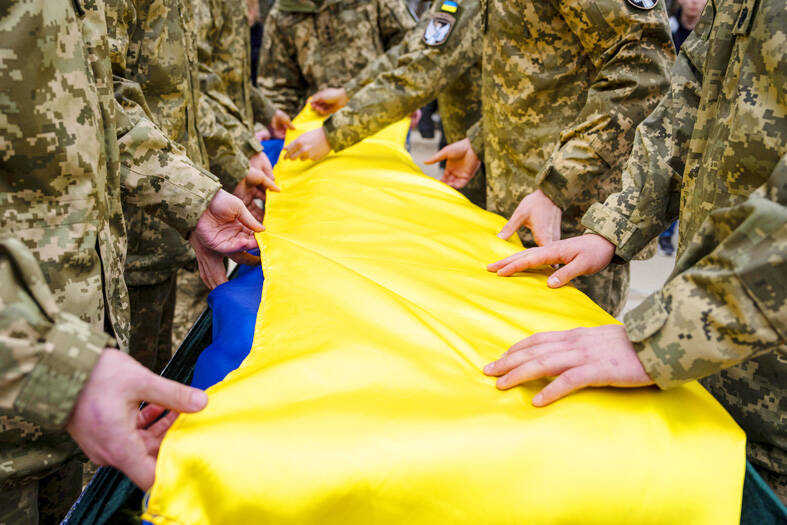Moscow took Minsk as a “nuclear hostage” after Russian President Vladimir Putin announced the deployment of tactical nuclear weapons to Belarus, the Ukrainian government said yesterday, as it blasted a plan that would bring the arms to a country at the gates of the EU.
Putin, who has issued thinly veiled warnings that Russia could use nuclear weapons if threatened, said the move was similar to the US transferring weapons to allies.
“The Kremlin took Belarus as a nuclear hostage,” Ukrainian National Security and Defense Council Secretary Oleksiy Danilov wrote on Twitter.

Photo: AP
He added that the move was “a step towards the internal destabilization of the country.”
On Saturday, Putin announced Russia would station tactical nuclear weapons to neighbor and ally Belarus “without violating our international agreements on nuclear non-proliferation.”
Ukrainian presidential adviser Mykhailo Podolyak accused the Russian leader of breaching such obligations.
Putin “admits that he is afraid of losing and all he can do is scare” people, Podolyak wrote on Twitter.
Belarusian President Alexander Lukashenko, who has been in power for almost 30 years, is a key Putin ally.
In February last year, Minsk allowed the Kremlin to launch its invasion of Ukraine from Belarusian territory.
Fears have since risen that Belarus might join its ally’s offensive, but Lukashenko said he would do so “only if attacked.”
In an interview broadcast on Saturday, Putin said the move to deploy tactical nuclear weapons to Belarus was “nothing unusual.”
“The United States has been doing this for decades. They have long placed their tactical nuclear weapons on the territory of their allies,” Putin said.
Putin said he spoke to Lukashenko, adding that they agreed “to do the same.”
Russia would start training crews on Monday next week and is planning to finish the construction of a special storage facility for tactical nuclear weapons by July 1, he said.
Putin has previously said that nuclear tensions were “rising” globally, but that Moscow would not deploy first.
He said renewed discussions with Lukashenko on the issue were spurred by a British official’s suggestion to send depleted uranium weapons to Ukraine.
Russia would respond if the West supplied Ukraine with such ammunition, he added.
“Russia of course has what it needs to answer. Without exaggeration, we have hundreds of thousands of such shells. We have not used them yet,” Putin said.
He said depleted uranium weapons “can be classified as the most harmful and hazardous for humans ... and also for the environment.”
Depleted uranium munitions are highly effective at piercing armor plate, but the metal is toxic for the soldiers who use them and civilians in areas where they are fired.

DEFENDING DEMOCRACY: Taiwan shares the same values as those that fought in WWII, and nations must unite to halt the expansion of a new authoritarian bloc, Lai said The government yesterday held a commemoration ceremony for Victory in Europe (V-E) Day, joining the rest of the world for the first time to mark the anniversary of the end of World War II in Europe. Taiwan honoring V-E Day signifies “our growing connections with the international community,” President William Lai (賴清德) said at a reception in Taipei on the 80th anniversary of V-E Day. One of the major lessons of World War II is that “authoritarianism and aggression lead only to slaughter, tragedy and greater inequality,” Lai said. Even more importantly, the war also taught people that “those who cherish peace cannot

STEADFAST FRIEND: The bills encourage increased Taiwan-US engagement and address China’s distortion of UN Resolution 2758 to isolate Taiwan internationally The Presidential Office yesterday thanked the US House of Representatives for unanimously passing two Taiwan-related bills highlighting its solid support for Taiwan’s democracy and global participation, and for deepening bilateral relations. One of the bills, the Taiwan Assurance Implementation Act, requires the US Department of State to periodically review its guidelines for engagement with Taiwan, and report to the US Congress on the guidelines and plans to lift self-imposed limitations on US-Taiwan engagement. The other bill is the Taiwan International Solidarity Act, which clarifies that UN Resolution 2758 does not address the issue of the representation of Taiwan or its people in

US Indo-Pacific Commander Admiral Samuel Paparo on Friday expressed concern over the rate at which China is diversifying its military exercises, the Financial Times (FT) reported on Saturday. “The rates of change on the depth and breadth of their exercises is the one non-linear effect that I’ve seen in the last year that wakes me up at night or keeps me up at night,” Paparo was quoted by FT as saying while attending the annual Sedona Forum at the McCain Institute in Arizona. Paparo also expressed concern over the speed with which China was expanding its military. While the US

‘FALLACY’: Xi’s assertions that Taiwan was given to the PRC after WWII confused right and wrong, and were contrary to the facts, the Ministry of Foreign Affairs said The Ministry of Foreign Affairs yesterday called Chinese President Xi Jinping’s (習近平) claim that China historically has sovereignty over Taiwan “deceptive” and “contrary to the facts.” In an article published on Wednesday in the Russian state-run Rossiyskaya Gazeta, Xi said that this year not only marks 80 years since the end of World War II and the founding of the UN, but also “Taiwan’s restoration to China.” “A series of instruments with legal effect under international law, including the Cairo Declaration and the Potsdam Declaration have affirmed China’s sovereignty over Taiwan,” Xi wrote. “The historical and legal fact” of these documents, as well